Ikram Mohamed
TEXAS TRIBUNE
Sun, June 2, 2024
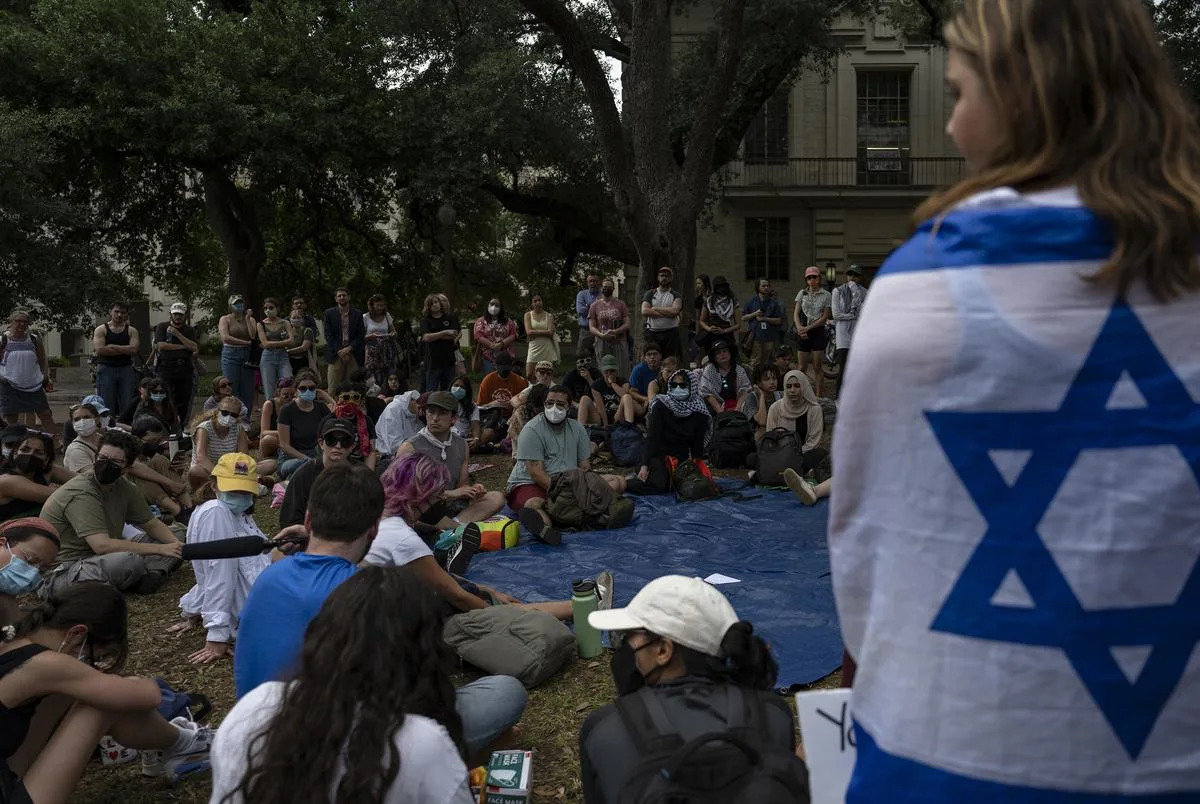
A student draped with an Israeli flag listens as University of Texas at Austin professors Pavithra Vasudevan and Karma Chavez lead students in a discussion during a pro-Palestinian teach-in on campus on Tuesday, April 30, 2024. Credit: Eli Hartman/The Texas Tribune
In early April, Jadd Hashem and Elijah Kahlenberg sat at a table between the Texas Hillel’s annual Israel Block Party at the University of Texas at Austin and a demonstration organized by the Palestinian Solidarity Committee. A sign taped at the front of their table read: “One Palestinian. One Jew. Two Brothers. Ask us anything.”
For three and a half hours, Kahlenberg and Hashem talked to anyone who was interested about the Israel-Hamas war and the decades-long tensions in the Middle East. Most exchanges were cordial but toward the end a conversation got heated with a person who said she had survived the Oct. 7 attack Hamas launched on Israel.
Kahlenberg said a crowd of Israel supporters soon gathered around them, not just criticizing the two friends’ views on the conflict but questioning his Jewishness. He said he was called a self-hating Jew and a Kapo, a term referring to Jewish inmates in concentration camps who were appointed to oversee other prisoners.
“Jadd is Palestinian, of course, he's gonna have these views and they're gonna be against it,” Kahlenberg said. “But for me, they were like, ‘oh, Elijah, this guy is a traitor.’”
Since tensions exploded on U.S. campuses in response to the Israel-Hamas war, some Jewish students at UT-Austin have urged state and university leaders to express their support for Israel while others have participated in pro-Palestinian demonstrations. The rift has left many Jewish students with a wide range of views on the conflict feeling unsafe, highlighting the difficulty of holding discussions about the Middle East conflict at Texas universities.
On Oct. 7, Hamas, a Palestinian militant group, attacked the Tribe of Nova music festival in Re'im, Israel, killing more than 1,100 people and taking 253 hostages. Israel responded with a siege on Gaza that has killed about 35,300 Palestinians and left over 79,000 injured.
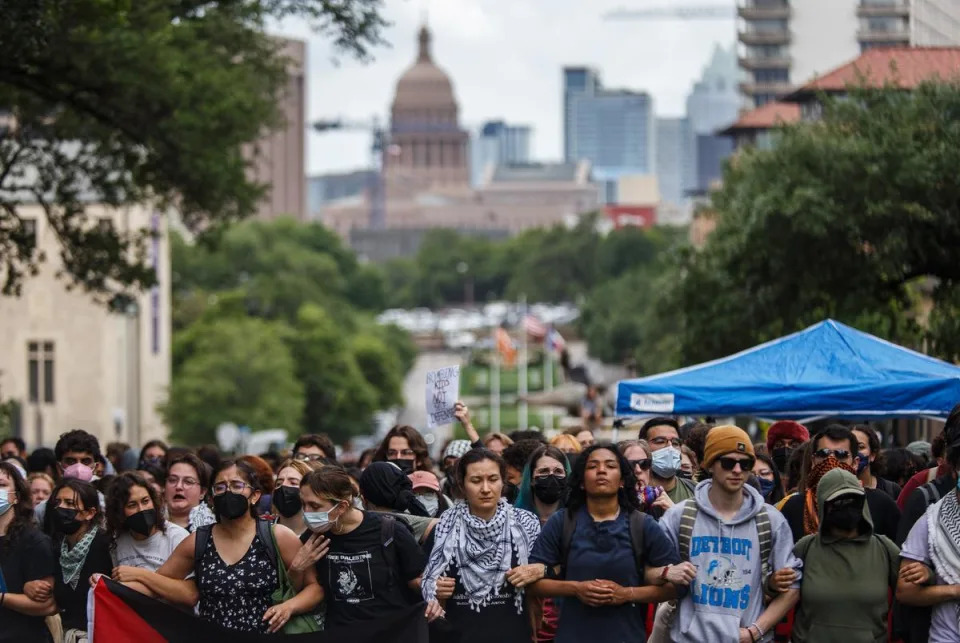
Student protesters, confronted by a heavy police presence, link arms to stymie arrests on the University of Texas campus on April 24, 2024. Credit: Julius Shieh/The Texas Tribune
The war sparked fierce pro-Palestinian demonstrations across U.S. campuses. At UT-Austin, hundreds of students walked out of class on April 24 to protest the siege on Gaza, leading to the arrest of 57 people after police ordered them to disperse. Five days later, 79 more people were arrested after protesters tried to set up an encampment on campus grounds.
Some students, faculty and free speech experts have criticized the university and law enforcement response as heavy-handed. UT-Austin officials defended their actions saying encampments are against university rules and some state leaders lauded the police crackdowns while blasting the demonstrations as antisemitic.
The protests have also triggered different feelings, reactions and opinions among Jewish students.
Levi Fox, a sophomore at the University of Texas at Austin, said he was in his Jewish fraternity house on Oct. 9 when he got a call that one of his friends was among the victims of the Hamas attack.
“I collapsed to my knees crying,” he said. “To know someone that was murdered in such a brutal way … it gave me a whole new perspective on what's going on.”
Since then, Fox has participated in several counter-protests in response to the pro-Palestinian demonstrations. During a May 14 hearing before the Texas Senate Subcommittee on Higher Education to discuss the protests, Fox said he’s had pennies thrown at him, a student told him to “go back to Germany” and a professor told him “they’ll come after you and put you in the ovens next.” He said he gave the professor’s name to senators but didn’t want to share it publicly because the university is investigating the incident.
Fox told lawmakers some students have taken off their yarmulkes or hidden Stars of David hanging around their necks to avoid being harassed.
“When someone, of any faith, feels like they need to hide their faith, that is a failure on all of us,” Fox said. “State leaders have a responsibility to ensure that everyone can express their faith without fear.”
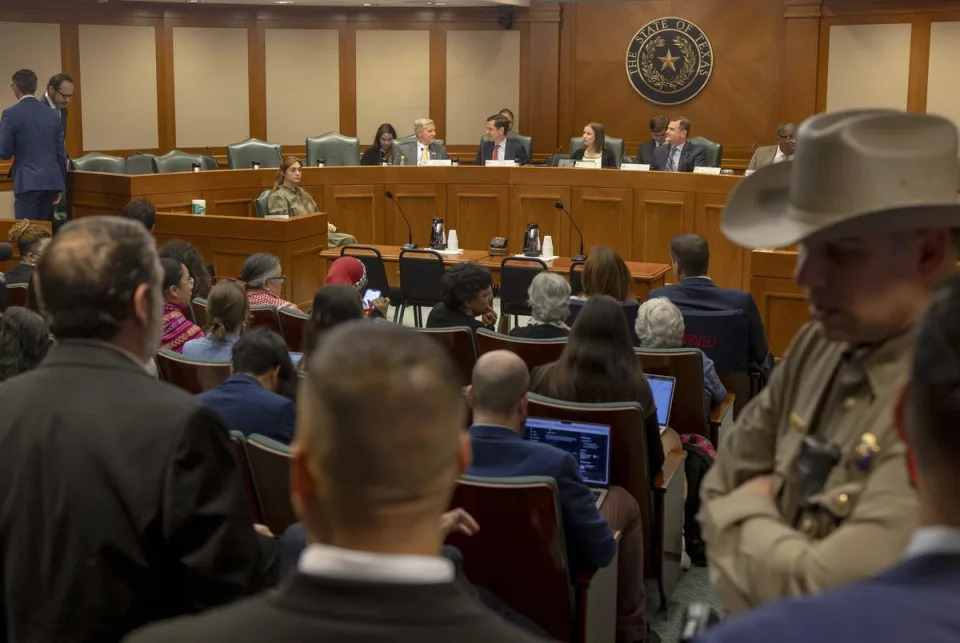
Seats fill in the hearing and overflow rooms at the Texas Senate Subcommittee on Higher Education hearing on free speech on May 14, 2024. Credit: Leila Saidane for The Texas Tribune
Fox said he felt the pro-Palestinian demonstrations were inherently antisemitic and applauded the university and law enforcement for their response.
“When you say, ‘There is only one solution, Intifada revolution,’ you are saying that the only solution is a brutal and violent series of terrorist attacks targeted toward civilians,” Fox said. “You cannot blame the state of Texas and the university for working to ensure the safety of civilians when violent threats like that are made. That has no place here at UT-Austin or anywhere in the world for hate or violence.”
Barri Seitz, a UT-Austin sophomore, said she was also grateful for the swift action against the demonstrators. She said some people at smaller protests have called her slurs and told her “to go back to Poland.”
She said she believed protesting against Israel is antisemitic, stating that Judaism and Zionism are intrinsic parts of one another and that someone Jewish who doesn’t support Israel is denying a large part of their identity.
Carla Robinson, a Jewish UT graduate student who’s been protesting in support of Palestinians, said that statements like these have been hurtful and frustrating to hear. She said Israel and Zionism are not the same as Judaism.
“I think antisemitism is being weaponized to stifle criticism of the state of Israel and the genocide it's carrying out against Palestinian people,” Robinson said. “It makes antisemitism meaningless when you expand the definition in that way to include critique of Israel, which then makes it harder to address real antisemitism that's happening, along with Islamophobia and racism and sexism.”
Sam Law, a Jewish UT-Austin graduate student, said he was proud of participating in pro-Palestinian demonstrations and angered at the university’s decision to call the police on their own students. He was among the protesters arrested at UT-Austin on April 29.
Law said many of his relatives were killed in concentration camps in Poland during World War II and that hearing those stories from his family made him empathize with Palestinians’ suffering.
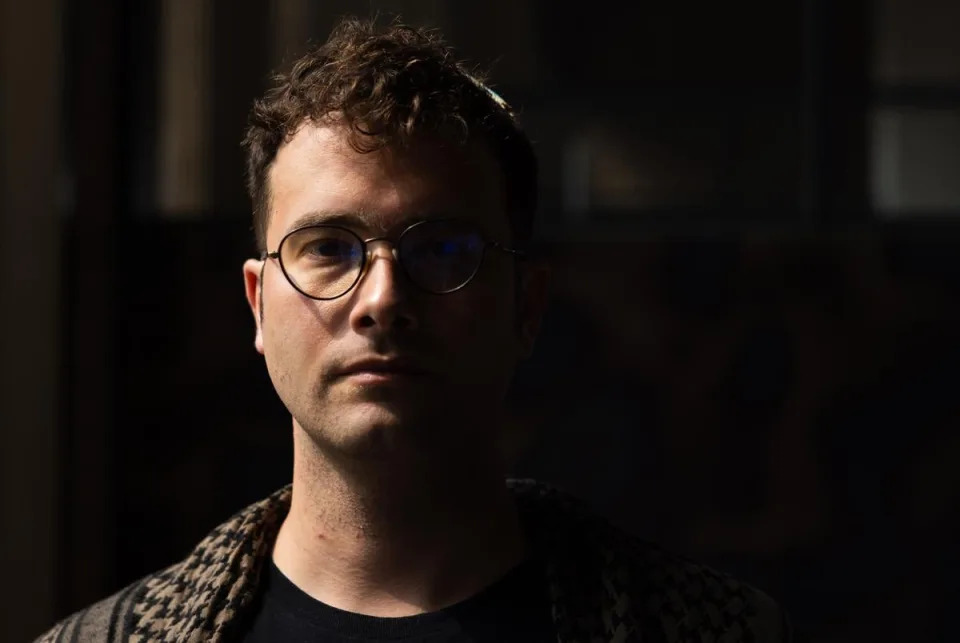
Sam Law, a Jewish doctoral student at UT-Austin who is sympathetic to the Palestinians' plight in Gaza, poses for a photo in the Fine Arts Library on May 23, 2024. Credit: Maria Crane/The Texas Tribune
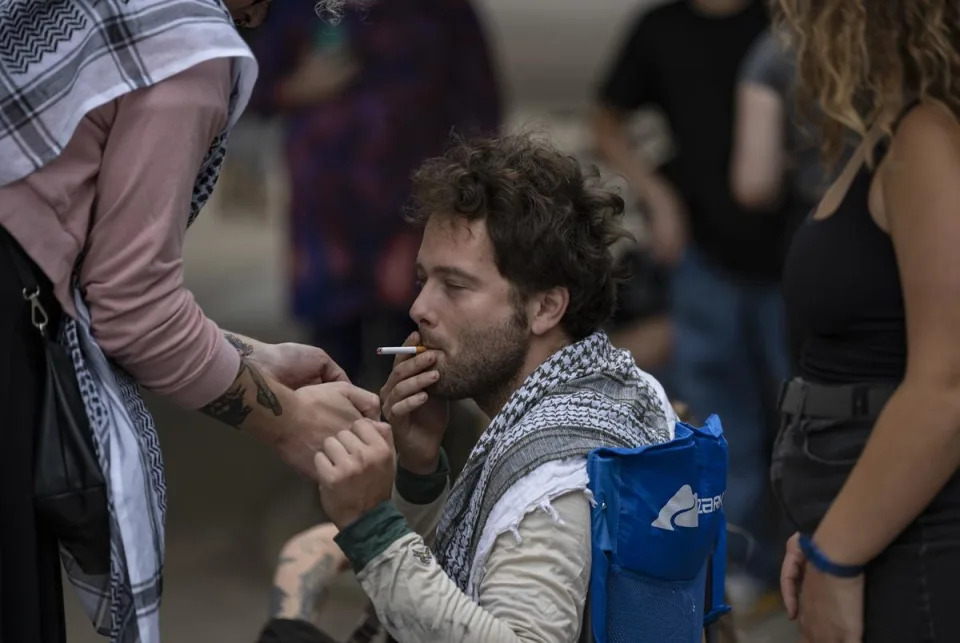
Sam Law smokes a cigarette shortly after being released from the Travis County Jail on April 30, 2024. Law was arrested the previous day at a demonstration on the UT campus in support of Palestinians. Credit: Eli Hartman/The Texas Tribune
Many lawmakers and alumni have thanked UT-Austin President Jay Hartzell for his response to the protests on campus. A letter published by Alums for Campus Fairness, an alumni group that seeks to counter antisemitism and the “demonization of Israel” on college campuses, said the protests have “sought to silence Jewish students.”
Law said people like Harlan Crow — a GOP mega-donor and a UT-Austin alum who has been criticized for owning a collection of Nazi artifacts and was among the signatories of the Alums for Campus Fairness letter — are the ones that make him feel unsafe. He also condemned the university for allowing some speakers like Kate Hopkins, a far-right personality who has stirred controversy for echoing Nazi rhetoric and was invited by a student group to visit the campus in 2018.
Lawmakers, university officials and the alumni “can claim all they want that what they're doing is about protecting Jewish safety, but this is not true,” Law said. “The people who've made me feel unsafe are them.”
Difficult conversations
Aaron Sandel, a UT-Austin professor in anthropology who is Jewish, said he saw many Jewish students struggle to sort their thoughts and voice concerns about their safety in the wake of the Israel-Hamas war. Believing that complex feelings should be processed privately and with friends, he offered to facilitate an open discussion at his home one day in October. Sandel wanted to help students distinguish between feeling unsafe and uncomfortable, which he said are often confused.
“Discomfort should be reduced and addressed, and we don't want people feeling uncomfortable if it's stressing them out and distracting them. But discomfort can sometimes be a necessary part of thinking through difficult issues,” he said.
About 10 Jewish graduate students, faculty members and friends sat in Sandel’s living room voicing different opinions and feelings about the Middle East conflict and the discomfort they have felt on campus.
While there were disagreements, Sandel said the conversation never turned tense. He said it was similar to a classroom discussion in which people disagree without becoming disrespectful.
Sandel believes the discussion allowed students to find others they could turn to when they need someone to confide in.
Law attended the discussion Sandel hosted and said it was one of the hardest conversations he’s had. But he felt it helped attendees better understand each other’s stances.
Kahlenberg, the student who set up a table with his Palestinian friend in April, said he founded the student group Atidna two years ago also in hopes of fostering an open dialogue about the Middle East conflict and advancing the idea that Jews and Arabs don’t need to be enemies.
While Kahlenberg says Atidna is an apolitical organization, he and Hashem, the group’s vice president and Kahlenberg’s best friend, have participated in pro-Palestinian demonstrations calling for a ceasefire.
Kahlenberg said he’s felt less welcome in Jewish spaces lately because of his views. It’s a feeling that has made him stay home rather than celebrate holidays with others in the Jewish community.
“I do not want to be in a holiday setting or in a Shabbat or adjacent setting where I have to justify why I think Palestinians deserve to live,” Kahlenberg said. “To me, that's not worth my time and not worth my safety. There are people that might be very abrasive to me being in that space, so there is always a risk of violence.”
Sitting in two lawn chairs on UT-Austin’s campus, just days after police cracked down on two massive protests at the university, two visiting poets — Naomi Shihab Nye, who is Palestinian-American, and Edward Hirsch, who is Jewish-American — lamented how the divide over the Israel-Hamas war had led to a gulf of silence between students with opposing views on the conflict.
Chants like “From the river to the sea,” are commonplace in pro-Palestinian demonstrations but they can be polarizing and leave little room for understanding and compassion, Hirsch said.
“From the river to the sea” alludes to the stretch of land from the Jordan River on the eastern flank of Israel and the occupied West Bank to the Mediterranean Sea to the west. Pro-Palestinian activists say the chant advocates for peace and equality in the Middle East. But Jewish groups have described it as a call for the eradication of Israel.
Sun, June 2, 2024

A student draped with an Israeli flag listens as University of Texas at Austin professors Pavithra Vasudevan and Karma Chavez lead students in a discussion during a pro-Palestinian teach-in on campus on Tuesday, April 30, 2024. Credit: Eli Hartman/The Texas Tribune
In early April, Jadd Hashem and Elijah Kahlenberg sat at a table between the Texas Hillel’s annual Israel Block Party at the University of Texas at Austin and a demonstration organized by the Palestinian Solidarity Committee. A sign taped at the front of their table read: “One Palestinian. One Jew. Two Brothers. Ask us anything.”
For three and a half hours, Kahlenberg and Hashem talked to anyone who was interested about the Israel-Hamas war and the decades-long tensions in the Middle East. Most exchanges were cordial but toward the end a conversation got heated with a person who said she had survived the Oct. 7 attack Hamas launched on Israel.
Kahlenberg said a crowd of Israel supporters soon gathered around them, not just criticizing the two friends’ views on the conflict but questioning his Jewishness. He said he was called a self-hating Jew and a Kapo, a term referring to Jewish inmates in concentration camps who were appointed to oversee other prisoners.
“Jadd is Palestinian, of course, he's gonna have these views and they're gonna be against it,” Kahlenberg said. “But for me, they were like, ‘oh, Elijah, this guy is a traitor.’”
Since tensions exploded on U.S. campuses in response to the Israel-Hamas war, some Jewish students at UT-Austin have urged state and university leaders to express their support for Israel while others have participated in pro-Palestinian demonstrations. The rift has left many Jewish students with a wide range of views on the conflict feeling unsafe, highlighting the difficulty of holding discussions about the Middle East conflict at Texas universities.
On Oct. 7, Hamas, a Palestinian militant group, attacked the Tribe of Nova music festival in Re'im, Israel, killing more than 1,100 people and taking 253 hostages. Israel responded with a siege on Gaza that has killed about 35,300 Palestinians and left over 79,000 injured.

Student protesters, confronted by a heavy police presence, link arms to stymie arrests on the University of Texas campus on April 24, 2024. Credit: Julius Shieh/The Texas Tribune
The war sparked fierce pro-Palestinian demonstrations across U.S. campuses. At UT-Austin, hundreds of students walked out of class on April 24 to protest the siege on Gaza, leading to the arrest of 57 people after police ordered them to disperse. Five days later, 79 more people were arrested after protesters tried to set up an encampment on campus grounds.
Some students, faculty and free speech experts have criticized the university and law enforcement response as heavy-handed. UT-Austin officials defended their actions saying encampments are against university rules and some state leaders lauded the police crackdowns while blasting the demonstrations as antisemitic.
The protests have also triggered different feelings, reactions and opinions among Jewish students.
Levi Fox, a sophomore at the University of Texas at Austin, said he was in his Jewish fraternity house on Oct. 9 when he got a call that one of his friends was among the victims of the Hamas attack.
“I collapsed to my knees crying,” he said. “To know someone that was murdered in such a brutal way … it gave me a whole new perspective on what's going on.”
Since then, Fox has participated in several counter-protests in response to the pro-Palestinian demonstrations. During a May 14 hearing before the Texas Senate Subcommittee on Higher Education to discuss the protests, Fox said he’s had pennies thrown at him, a student told him to “go back to Germany” and a professor told him “they’ll come after you and put you in the ovens next.” He said he gave the professor’s name to senators but didn’t want to share it publicly because the university is investigating the incident.
Fox told lawmakers some students have taken off their yarmulkes or hidden Stars of David hanging around their necks to avoid being harassed.
“When someone, of any faith, feels like they need to hide their faith, that is a failure on all of us,” Fox said. “State leaders have a responsibility to ensure that everyone can express their faith without fear.”

Seats fill in the hearing and overflow rooms at the Texas Senate Subcommittee on Higher Education hearing on free speech on May 14, 2024. Credit: Leila Saidane for The Texas Tribune
Fox said he felt the pro-Palestinian demonstrations were inherently antisemitic and applauded the university and law enforcement for their response.
“When you say, ‘There is only one solution, Intifada revolution,’ you are saying that the only solution is a brutal and violent series of terrorist attacks targeted toward civilians,” Fox said. “You cannot blame the state of Texas and the university for working to ensure the safety of civilians when violent threats like that are made. That has no place here at UT-Austin or anywhere in the world for hate or violence.”
Barri Seitz, a UT-Austin sophomore, said she was also grateful for the swift action against the demonstrators. She said some people at smaller protests have called her slurs and told her “to go back to Poland.”
She said she believed protesting against Israel is antisemitic, stating that Judaism and Zionism are intrinsic parts of one another and that someone Jewish who doesn’t support Israel is denying a large part of their identity.
Carla Robinson, a Jewish UT graduate student who’s been protesting in support of Palestinians, said that statements like these have been hurtful and frustrating to hear. She said Israel and Zionism are not the same as Judaism.
“I think antisemitism is being weaponized to stifle criticism of the state of Israel and the genocide it's carrying out against Palestinian people,” Robinson said. “It makes antisemitism meaningless when you expand the definition in that way to include critique of Israel, which then makes it harder to address real antisemitism that's happening, along with Islamophobia and racism and sexism.”
Sam Law, a Jewish UT-Austin graduate student, said he was proud of participating in pro-Palestinian demonstrations and angered at the university’s decision to call the police on their own students. He was among the protesters arrested at UT-Austin on April 29.
Law said many of his relatives were killed in concentration camps in Poland during World War II and that hearing those stories from his family made him empathize with Palestinians’ suffering.

Sam Law, a Jewish doctoral student at UT-Austin who is sympathetic to the Palestinians' plight in Gaza, poses for a photo in the Fine Arts Library on May 23, 2024. Credit: Maria Crane/The Texas Tribune

Sam Law smokes a cigarette shortly after being released from the Travis County Jail on April 30, 2024. Law was arrested the previous day at a demonstration on the UT campus in support of Palestinians. Credit: Eli Hartman/The Texas Tribune
Many lawmakers and alumni have thanked UT-Austin President Jay Hartzell for his response to the protests on campus. A letter published by Alums for Campus Fairness, an alumni group that seeks to counter antisemitism and the “demonization of Israel” on college campuses, said the protests have “sought to silence Jewish students.”
Law said people like Harlan Crow — a GOP mega-donor and a UT-Austin alum who has been criticized for owning a collection of Nazi artifacts and was among the signatories of the Alums for Campus Fairness letter — are the ones that make him feel unsafe. He also condemned the university for allowing some speakers like Kate Hopkins, a far-right personality who has stirred controversy for echoing Nazi rhetoric and was invited by a student group to visit the campus in 2018.
Lawmakers, university officials and the alumni “can claim all they want that what they're doing is about protecting Jewish safety, but this is not true,” Law said. “The people who've made me feel unsafe are them.”
Difficult conversations
Aaron Sandel, a UT-Austin professor in anthropology who is Jewish, said he saw many Jewish students struggle to sort their thoughts and voice concerns about their safety in the wake of the Israel-Hamas war. Believing that complex feelings should be processed privately and with friends, he offered to facilitate an open discussion at his home one day in October. Sandel wanted to help students distinguish between feeling unsafe and uncomfortable, which he said are often confused.
“Discomfort should be reduced and addressed, and we don't want people feeling uncomfortable if it's stressing them out and distracting them. But discomfort can sometimes be a necessary part of thinking through difficult issues,” he said.
About 10 Jewish graduate students, faculty members and friends sat in Sandel’s living room voicing different opinions and feelings about the Middle East conflict and the discomfort they have felt on campus.
While there were disagreements, Sandel said the conversation never turned tense. He said it was similar to a classroom discussion in which people disagree without becoming disrespectful.
Sandel believes the discussion allowed students to find others they could turn to when they need someone to confide in.
Law attended the discussion Sandel hosted and said it was one of the hardest conversations he’s had. But he felt it helped attendees better understand each other’s stances.
Kahlenberg, the student who set up a table with his Palestinian friend in April, said he founded the student group Atidna two years ago also in hopes of fostering an open dialogue about the Middle East conflict and advancing the idea that Jews and Arabs don’t need to be enemies.
While Kahlenberg says Atidna is an apolitical organization, he and Hashem, the group’s vice president and Kahlenberg’s best friend, have participated in pro-Palestinian demonstrations calling for a ceasefire.
Kahlenberg said he’s felt less welcome in Jewish spaces lately because of his views. It’s a feeling that has made him stay home rather than celebrate holidays with others in the Jewish community.
“I do not want to be in a holiday setting or in a Shabbat or adjacent setting where I have to justify why I think Palestinians deserve to live,” Kahlenberg said. “To me, that's not worth my time and not worth my safety. There are people that might be very abrasive to me being in that space, so there is always a risk of violence.”
Sitting in two lawn chairs on UT-Austin’s campus, just days after police cracked down on two massive protests at the university, two visiting poets — Naomi Shihab Nye, who is Palestinian-American, and Edward Hirsch, who is Jewish-American — lamented how the divide over the Israel-Hamas war had led to a gulf of silence between students with opposing views on the conflict.
Chants like “From the river to the sea,” are commonplace in pro-Palestinian demonstrations but they can be polarizing and leave little room for understanding and compassion, Hirsch said.
“From the river to the sea” alludes to the stretch of land from the Jordan River on the eastern flank of Israel and the occupied West Bank to the Mediterranean Sea to the west. Pro-Palestinian activists say the chant advocates for peace and equality in the Middle East. But Jewish groups have described it as a call for the eradication of Israel.
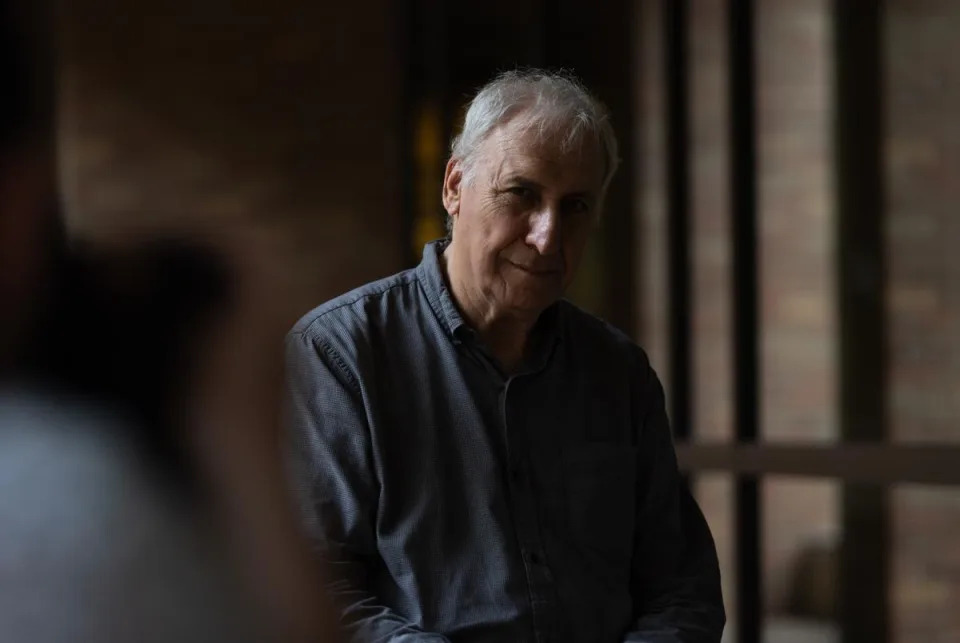
Israeli-American poet and author Edward Hirsch poses for a photo on Wednesday, May 1, 2024, in Austin. Credit: Maria Crane/The Texas Tribune
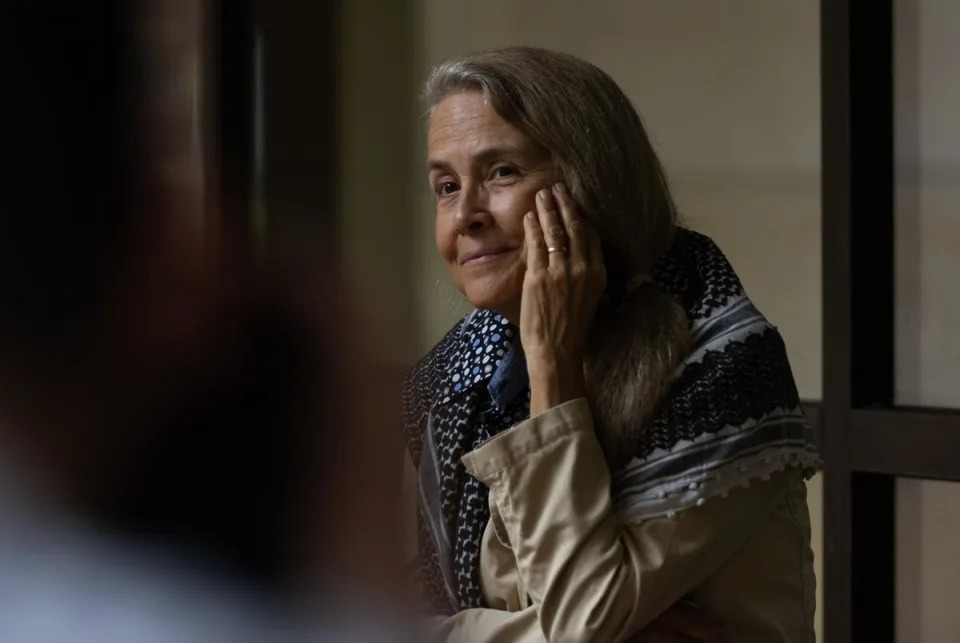
Palestinian-American poet and author Naomi Shihab Nye poses for a photo on Wednesday, May 1, 2024, in Austin. Credit: Maria Crane/The Texas Tribune
“People are not using words more in this moment of catastrophe,” Shihab Nye said. “I haven’t heard any eloquent talks from anyone on either side being exchanged or suggestions of dialogues.”
Shihab Nye said it’s important to highlight the diverse perspectives within the protest movement.
“More needs to be made of Jewish people who are protesting for a ceasefire. I am profoundly grateful for that,” Shihab Nye said.
The conflict has also led some Jewish students to reflect on some of the core values of Judaism.
The highest principle in Judaism is called Pikuach Nefesh, which calls for the protection of life over all other religious considerations. Law said he was raised with this belief and that empathy as Jews doesn’t end with other Jewish people. That’s why he’s continued to protest in support of Palestinians, he said.
Fox also reflected on the same commandment and said he’s horrified at the loss of civilian life on either side of the conflict.
Students with opposing views on the war have acknowledged the value of dialogue during this time, despite how difficult it can be to talk with one another.
Most people Hashem and Kahlenberg spoke to during the Israel Block Party acknowledged the importance of basic human rights, no matter the stance they took on the issue. The pair hopes that more conversations can be had in the future and said this kind of dialogue is vital for peacebuilding on campus and beyond it.
“This is really how you break down the hate on campuses — by meeting the other — and I think many are recognizing that,” Kahlenberg said.
Sneha Dey contributed to this report.
Disclosure: University of Texas at Austin has been a financial supporter of The Texas Tribune, a nonprofit, nonpartisan news organization that is funded in part by donations from members, foundations and corporate sponsors. Financial supporters play no role in the Tribune's journalism. Find a complete list of them here.
At UT, a hope for peace and understanding amid Israeli-Palestinian conflict. Meet Atidna.
Lily Kepner, Austin American-Statesman
Mon, June 3, 2024
Elijah Kahlenberg sits on a stone bench by the South Mall at the University of Texas on a warm day in May. Just weeks ago, on April 24, he was on the opposite side of the lawn at a pro-Palestinian protest in which 57 people were arrested after mounted police and officers on bikes and on foot descended on campus.
“At one point, a state trooper on horseback charged the crowd, and I was pushed by that state trooper,” Kahlenberg said. “I ended up spraining my ankle because of that.”
Kahlenberg, a UT Jewish student, said he believes in understanding, and he joined the protest to talk to Arab and Palestinian students, and because he, too, wants UT to divest from weapons manufacturers.
The April 24 protest was organized by the Palestine Solidarity Committee, a registered student group at UT and a chapter of national Students for Justice in Palestine, to call for a cease-fire in Gaza amid the Israel-Hamas war and to demand that UT divest from weapons manufacturers selling arms to Israel. UT System Board of Regents Chairman Kevin Eltife has said that "divestment is not an option."
Kahlenberg said he often finds himself in this position — seeking dialogue with the goal of understanding — even at the seemingly most difficult times. He said the police response to the protest “enraged” him, but it also made his mission more important.
Amid a nationwide climate at universities of escalating tensions over the Mideast conflict, Kahlenberg founded a small but growing student organization, Atidna International, to facilitate open dialogue between Jewish and Arab people, find common ground, understand differences and unite in peace. The group (which is led by Kahlenberg and his best friend, Jadd Hashem, a Palestinian junior at UT) took its name from the Hebrew word for future, “Atid,” and the Arabic suffix for our, “na,” translating to “our future” — Atidna.
Throughout the fall and spring, the American-Statesman spent time with Kahlenberg and Hashem to learn how the group functions at UT — which, like other campuses around the nation, has been roiled by antisemitic and Islamophobic incidents and, most recently, by significant police responses to protests that some say pose a threat to free speech ― and how it perseveres with its mission of peaceful discussion when tensions are highly charged.
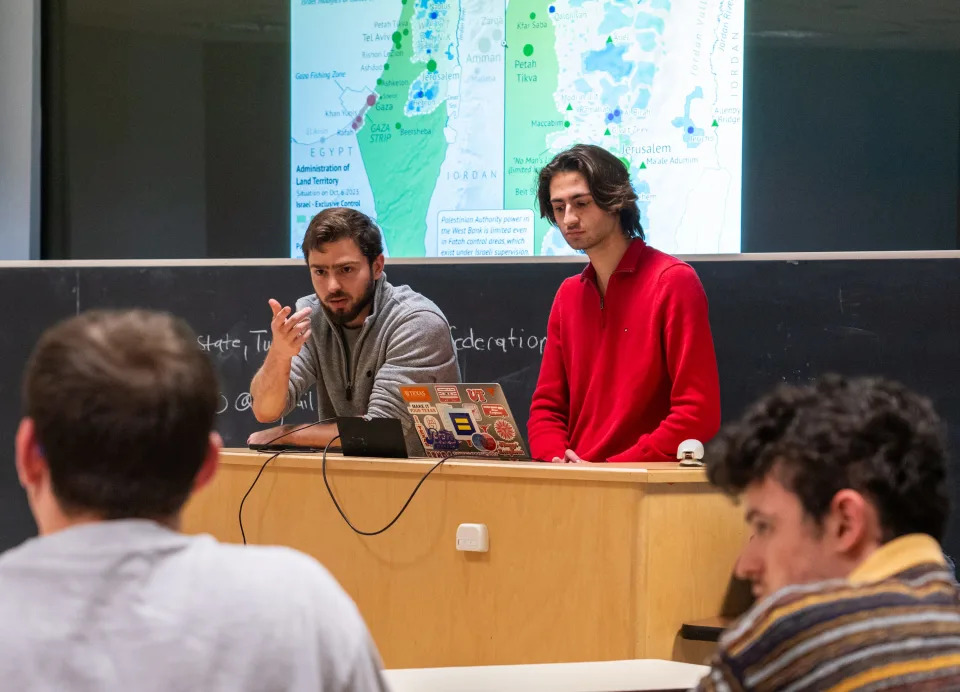
Atidna International President Elijah Kahlenberg, left, leads a dialogue with Vice President and Head of Palestinian Dialogue Jadd Hashem during a club meeting at the University of Texas in March. Atidna seeks to facilitate peaceful dialogue and increased understanding between pro-Israeli and pro-Palestinian students.
What is Atidna?
Atidna, founded two years ago by Kahlenberg, is a nonprofit student organization dedicated to allowing Israeli, Palestinian, Jewish and Arab people on campus to come together in dialogue and understanding about the Israeli-Palestinian conflict.
The group was also built from the belief that “Jews and Arabs are cousins, not enemies” and that open discussions can break down tensions and polarization between the two groups. Every month, it holds a dialogue session that lasts an hour and a half on topics from history to the present day to the recent protests on campus.
“It doesn't always mean agreement. It just simply means understanding,” Hashem said about what he thinks is the “missing step” on college campuses.
The organization has recently gained attention from national outlets such as "Good Morning America," Al Jazeera and CNN. Students at 15 universities have reached out to start their own chapters, Kahlenberg said, and there are now established chapters at the University of Pennsylvania, the University of Chicago, Columbia University and Harvard University.
“We had a team that truly believed that Jews and Arabs are a family, and that our aspirations don't inherently conflict,” Kahlenberg said. “And when you can be in a space to hear something like that, hear how similar the ‘other’ is to you, it breaks down a lot of that radicalism and hatred.”
How does Atidna work?
After Hamas, a militant Palestinian group, attacked Israel on Oct. 7, killing 1,200 people and taking more than 200 hostages, and Israel’s military responded by continually bombarding Gaza, where more than 34,000 Palestinians reportedly have been killed, Atidna's two leaders held a vigil for all to come together in mutual mourning on the one-month anniversary of the attack.
Both Kahlenberg and Hashem had distant family members directly affected by the Oct. 7 attack and the ensuing violence in Gaza, they said. Though they've lost some group members since the war began, they have gained even more.
“We recognize that when times get tough like this, it is more important to meet with the other than ever, because you understand that, while you're grieving, they're also grieving,” Kahlenberg said. “When you can grieve together, that is a time for humanity.”
The dialogues Atidna facilitates, they said, allow people to be vulnerable about their beliefs and experiences without fear or argument. That free speech element was really important to cement into the group's mission, Hashem said.
There is no political agenda at the group meetings, but there are rules for who can join. Hashem said those who join are invited to the sessions to ensure an intimate and productive discussion with a variety of viewpoints. These viewpoints can span a wide range but must be grounded in the common value that people deserve the same rights, Hashem said.
“The only political position we take is that we believe that all peoples deserve the same human rights,” Hashem said, adding that this means participants are against occupation and apartheid but are from all backgrounds.
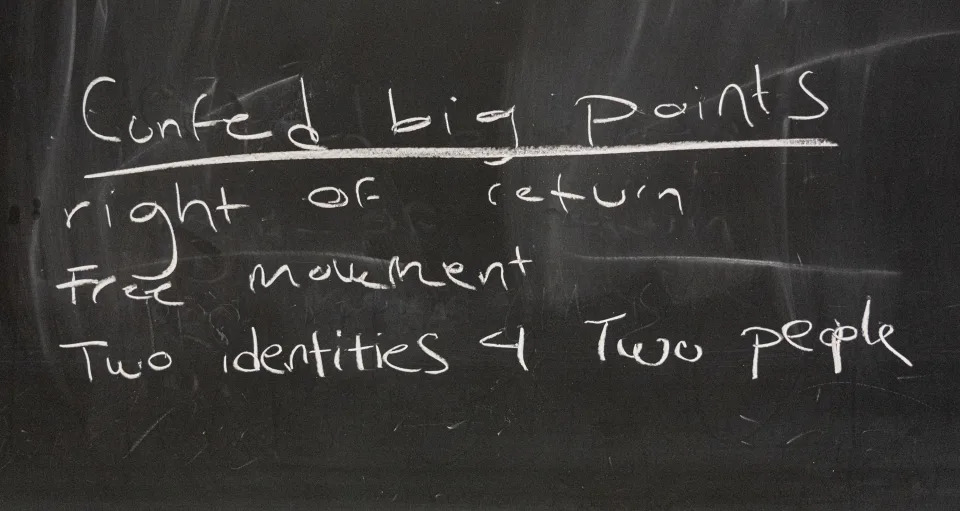
Talking points are written on a blackboard during an Atidna meeting March 19. The student group is built on the belief that “Jews and Arabs are cousins, not enemies” and that open discussions can break down tensions and polarization between the two groups.
Does Atidna's dialogue initiative work?
People have largely been supportive, Kahlenberg said. But that doesn’t mean the work is easy. Outside of Atidna, he said, “it seems like the extremes of both sides are trying to prevent a conversation from even happening.”
“I even had a death threat on Instagram,” he told the Statesman in November, before pro-Palestinian protests on college campuses began springing up. “It’s definitely a real threat. But that's not going to intimidate us.”
For dialogue to work, Hashem said, people have to be willing to listen and be honest, respectful and clear, particularly about how they define words and phrases such as Zionism, intifada and the controversial slogan "From the River to the Sea."
In addition to dialogue sessions, the group has hosted public events, such as sitting at a picnic table between the Israel Block Party and a pro-Palestinian counterprotest in April, engaging passersby in conversation with the sign “One Palestinian, One Jew, Two Brothers. Ask us Anything” — and for three hours, people asked them questions, almost all of them peacefully.
At one point, a person from the Israeli Block Party accused Kahlenberg of being a “traitor,” and when a group began surrounding him, he said, Hashem went to get help from within the block party, fearing it would get physical.
For Hashem, going to the protests doesn’t always feel emotionally safe. Zionists at the counterprotests, he said, can “very much like a personal attack on me.”
But he still attends the demonstrations, and he still engages in conversation.
“The reason that I'm willing to have dialogue is because I want to talk about my family's stories,” Hashem said. “I want to emphasize to as many Israelis as possible why I'm passionate about my beliefs, and I think that their beliefs actually go hand in hand with mine rather than against mine."
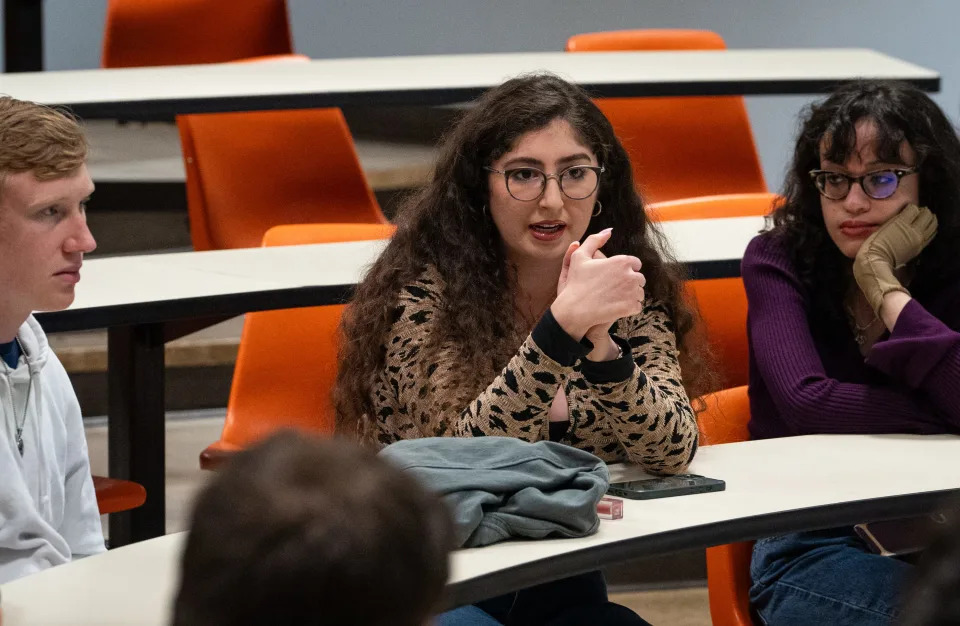
Atidna member Josianne Alwardi, a UT international relations major, speaks during a club meeting. Atidna's membership was growing before the April and May protests on college campuses, and the group has seen major interest and growth since those protests.
What impact does Atidna want to have?
Kahlenberg is triple-majoring in government, Middle Eastern studies and Jewish studies at UT, and Hashem is a government major with a minor in Middle Eastern studies. They'd both like to pursue law degrees and continue fostering conversations about Israel and Palestine in their future endeavors.
As for the organization, Kahlenberg said he’d love to see an Atidna chapter at every university. He said he'd encourage people, even off campuses, to consider engaging in conversations, taking the first uncomfortable step to bridge the gap and find similarities.
Earlier this year, Kahlenberg won the Truman Scholarship — a $30,000 federally funded grant that earned him a feature on UT news celebrating Atidna and a meeting with UT President Jay Hartzell that was captured in a video posted on X. The announcement happened just 12 days before the April 24 pro-Palestinian protest, which, due to the police response, prompted calls for Hartzell’s resignation.
Kahlenberg said he is not calling for Hartzell to resign, but he pushes back against the police response to the protest. If he were to see Hartzell again, Kahlenberg said, he’d open a conversation about it.
“I would say what happened on three Wednesdays ago was completely horrific. The suppression of students' rights was horrific,” Kahlenberg told the Statesman in May. “I respect you as an individual, the many amazing accomplishments you have provided for UT, but you have an obligation to protect your students.”
Hartzell has publicly supported Atidna and Kahlenberg's work.
"It’s great for the University. It’s great for the world," he said in a UT news release referring to Kahlenberg's prestigious award and Atidna's work. “It’s a time when that work is needed. When we say what starts here changes the world, we take it seriously.”
Hashem said he’d like to see UT partner with Atidna, especially because of the group's emphasis on free speech. He said he and Kahlenberg “believe that peace and liberation come hand in hand,” and that dialogue is the start to it.
"No one wants to see this war continue; we want to see people's lives being preserved and both people being able to fulfill their aspirations and our mutual homeland," Hashem said. "Through conversations like that, a world of hate is broken down. We see how similar we are at the end of the day.
“More people are waking up to the vision that we have of just understanding one another."
This article originally appeared on Austin American-Statesman: Atidna at UT operates from belief that Jews and Arabs are not enemies
No comments:
Post a Comment